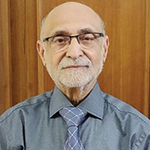Well, you are the doctor. You tell me how well or not well I am.
I started to get the feeling that if I persisted any more, she might simply walk out and never return.
The issue of the patient global assessment becomes more interesting if the accompanying person happens to be the father-in-law; he fully takes over the proceedings: “I will tell you how she is because she does not do anything and knows nothing!”
Moving the Appointment On
By this time I usually don’t feel like pursuing the issue anymore. I go about examining the patient, painstakingly doing the joint count, which my clinical assistant dutifully enters in the rheumatology-dedicated electronic medical record (EMR) with built-in DAS28, CDAI, SDAI calculator.6
Thankfully, erythrocyte sedimentation rates and C-reactive protein levels are almost always available. I insist patients bring reports of blood counts and other routine parameters carried out within a week of the clinic visit.
I enter a “best guess, free of bias figure” for the patient global assessment and pain VAS score, praying all the time to God to pardon me for this act of forgery.
Most of my patients are doing well and have high regard for me.7 At 80 years old, I am as busy in clinical work as ever.
My own feeling is that with better disease markers (profiling cell types, cytokines, chemokines and all the –omics), a time may come when we shall be able to drop the patient global assessment, eliminating stress for both the patient and the assessor.
 Prof. Anand N. Malaviya, MD, FRCP (Lond.), ACR Master, is a visiting senior consultant rheumatologist at ISIC Superspeciality Hospital, New Delhi, India, and retired head of the Department of Medicine and chief of Clinical Immunology and Rheumatology Services, All India Institute of Medical Sciences, New Delhi.
Prof. Anand N. Malaviya, MD, FRCP (Lond.), ACR Master, is a visiting senior consultant rheumatologist at ISIC Superspeciality Hospital, New Delhi, India, and retired head of the Department of Medicine and chief of Clinical Immunology and Rheumatology Services, All India Institute of Medical Sciences, New Delhi.
References
- Staff. How does health literacy affect the patient global assessment? The Rheumatologist [online]. 2019 May 8.
- Hirsh J, Wood P, Keniston A, et al. Limited health literacy and patient confusion about rheumatoid arthritis patient global assessments and model disease states. Arthritis Care Res (Hoboken). 2019 May;71(5):611–619.
- Ferreira RJO, de Wit M, Henriques M, et al. ‘It can’t be zero!’ Difficulties in completing patient global assessment in rheumatoid arthritis: A mixed methods study. Rheumatology (Oxford). 2020 May 1;59(5):1137–1147.
- Ferreira R, Carvalho PD, Ndosi M, et al. Impact of patient’s global assessment on achieving remission in patients with rheumatoid arthritis: A multinational study using the METEOR database. Arthritis Care Res (Hoboken). 2019 Oct;71(10):1317–1325.
- Pope JE, Michaud K. Is it time to banish composite measures for remission in rheumatoid arthritis? Arthritis Care Res (Hoboken). 2019 Oct;71(1):1300–1303.
- Malaviya AN, Gogia SB. Development, implementation and benefits of a rheumatology-specific electronic medical record application with automated display of outcome measures. Int J Rheumatic Dis. 2010 Oct;13(4):347–160.
- Malaviya AN, Gogia SB. Treatment of rheumatoid arthritis (RA) in India—how and by whom: Results from a speciality clinic—use of low-dose methotrexate (MTX) was inexplicably suboptimal. Clin Rheumatol. 2016 Sep;35(9):2163–2173.


